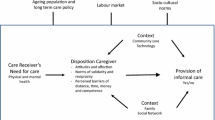Summary
In this study, we administered the Louvain Filial Maturity Scale [Marcoen 1993] to 61 adult children of demented elderly. The scores of the seven factors of this scale were compared to the scores of an unselected group of adult children examined by Marcoen. The results were taken into the context with caregiver’s burden, and the effect of filial maturity on parents’ institutionalisation was investigated. Marcoen’s results were confirmed. Only the means of “filial help” and “parental consideration” differed slightly from the means of the unselected group. Overall, filial maturity had no influence on the caregiver’s feeling of burden, but higher “parental consideration” resulted in lower caregiver burden. In addition, adult children with more “filial obligation” continued to care for their parents in the community more often, even when experiencing great burden and stress. However, institutionalisation was caused mainly by parents’ growing needs and increasing behavioural problems. We conclude that “filial maturity” seems to be a very stable concept. Further investigations should focus on the relevance of the Louvain Filial Maturity Scale for caregiving relationship and also on the arrangement of the scale in order to exclude a “pseudo”-stability with regard to burdensome life events and situations.
Zusammenfassung
In dieser Untersuchung wurde die Louvain Filial Maturity Scale bei 61 erwachsenen Kindern demenzkranker älterer Menschen eingesetzt. Die Scores der sieben Skalen der Louvain Filial Maturity Scale wichen nicht signifikant von denen der von Marcoen beschriebenen Gruppe ab. Die Ergebnisse wurden in den Kontext der Belastung von Pflegenden gestellt und der Effekt der filialen Reife auf die elterlichen Heimeinweisungen wurde untersucht. Trotz Abweichungen bei den Parametern „filiale Hilfe“ und „elterliche Wertschätzung“ wurden Marcoens Ergebnisse bestätigt. „Filiale Reife“ insgesamt hatte keinen Einfluss auf das Belastungsgefühl von Pflegenden, während eine höhere „elterliche Wertschätzung“ dieses Gefühl reduzierte. Außerdem behielten erwachsene Kinder mit größerem „filialen Verpflichtungsgefühl“ auch trotz eines hohen Belastungsgefühls die ambulante Pflege eher aufrecht. Wir halten „Filiale Reife“ für ein stabiles Konzept, die Louvain Filial Maturity Scale sollte weiter auf ihre Relevanz für Pflegebeziehungen untersucht werden.
Similar content being viewed by others
References
Blenkner M (1965) Social work and family relationships in later life with some thoughts on filial maturity. In: Shanas E, Streib G (eds) Social structure and the family: generational relations. Prentice-Hall, Englewood Cliffs, NJ, pp 46–59
Brody EM (1985) Parent care as a normative family stress. The Gerontologist 25:19–29
Bruder J (1988) Filiale Reife—Ein wichtiges Konzept für die familiäre Versorgung kranker, insbesondere dementer alter Menschen. Z Gerontol Psychol Psychiatr 1:95–101
Brunner E, Domhof S, Langer F (2001) Nonparametric analysis of longitudinal data in factorial experiments. Wiley, New York
Derogatis LR, Lipman RS, Covi L (1973) SCL-90: An outpatient psychiatry rating scale—preliminary report. Psychopharmacol Bull 9:13–28
Fahrenberg J, Hampel R, Selg H (1989) Das Freiburger Persönlichkeitsinventar: FPI, Handanweisung. Revid. Fassung FPI-R u. teilw. geänd., 5. erg. Auflage. Verlag für Psychologie Hogrefe, Göttingen Toronto Zürich
Finley N, Roberts M, Banahan B (1988) Motivators and inhibitors of attitudes of filial obligation towards aging parents. The Gerontologist 28:73–78
Haenselt R, Danielzik A, Waack K (2004) Zur Evaluation von angeleiteten Gesprächsgruppen für pflegende Angehörige von Demenzkranken. Ergebnisse des GENA-Projektes in Mecklenburg-Vorpommern. Z Gerontol Geriat 37:402–410
Jeste DV, Alexopoulos GS, Bartels SJ, Cummings JL, Gallo JJ, Gottlieb MD, Halpain MC, Palmer BW, Patterson TL, Reynolds CF, Lebowitz BD (1999) Consensus statement on the upcoming crisis in geriatric mental health. Arch Gen Psychiatry 56:848–853
Marcoen A (1993) Adult children as caregivers to aging parents: a measure of filial maturity. Poster, presented at the XV. Congress of the International Association of Gerontology, Budapest, 4.–9. Juli 1993
Marcoen A (1995) Filial maturity of middle-aged adult children in the context of parental care: model and measures. J Adult Dev 2:125–136
Mittelman MS, Ferris SH, Shulman E, Steinberg G, Levin B (1996) A family intervention to delay nursing home placement of patients with Alzheimer disease. A randomized controlled trial. J Am Med Assoc 276:1725–1731
Nydegger C (1991) The development of paternal and filial maturity. In: Pillemer K, McCartney K (eds) Parentchild relations throughout life. Lawrence Erlbaum Ass., Hillsdale, NJ, pp 31–46
Quayhagen MP, Quayhagen M, Corbeil RR, Hendrix RC, Jackson JE, Snyder L, Bower D (2000) Coping with dementia: evaluation of four nonpharmacological interventions. Int Psychogeriatr 12:249–265
Perrig-Chiello P, Sturzenegger M (2001) Social relations and filial maturity in middle-aged adults: contextual conditions and psychological determinants. Z Geront Geriat 34:21–27
Rainer M, Jungwirth S, Krüger-Rainer C, Croy A, Gatterer G, Haushofer M (2002) Pflegende Angehörige von Demenzerkrankten: Belastungsfaktoren und deren Auswirkung. Psychiat Prax 29:142–147
Spiegel R, Brunner C, Ermini-Fünfschilling D, Monsch A, Notter M, Puxty J, Tremmel L (1991) A new behavioral assessment scale for geriatric out- and in-patients: The NOSGER (Nurses’ Observation Scale for Geriatric Patients). J Am Geriatr Soc 39:339–347
Wancata J, Musalek M, Alexandrowicz R, Krautgartner M (2003) Number of dementia sufferers in Europe between the years 2000 and 2050. Eur Psychiatry 18:306–313
Yaffe K, Fox P, Newcomer R, Sands L, Lindquist K, Dane K, Covinsky KE (2002) Patient and caregiver characteristics and nursing home placement in patients with dementia. J Am Med Ass 287:2090–2097
Zarit SH, Reever KE, Bach-Peterson J (1980) Relatives of the impaired elderly: correlates of feeling of burden. The Gerontologist 20:649–655
Author information
Authors and Affiliations
Corresponding author
Rights and permissions
About this article
Cite this article
Stiens, G., Maeck, L. & Stoppe, G. Filial maturity as a predictor for the burden of demented parents’ caregivers. Z Gerontol Geriatr 39, 120–125 (2006). https://doi.org/10.1007/s00391-006-0336-z
Received:
Accepted:
Issue Date:
DOI: https://doi.org/10.1007/s00391-006-0336-z




